Contents


Water-soluble vitamin B2 (lat. – Riboflavin) was obtained during chemical experiments in 1935. Riboflavin, together with other B vitamins, has a versatile effect on the human body – it contributes to the functioning of the nervous system, digestion, participates in the mechanisms of oxidation, general metabolism, ensures the health of the skin, hair, nails.
There are other names for this vitamin, which depend on what it was isolated from. For example, if from plants – verdoflavin, if from milk – lactoflavin, from the liver – hepatoflavin, from egg white – ovoflavin.
Products-record holders for the content of vitamin B2
What foods have the most vitamin B2? The first place is occupied by the liver, for example, it is enough to eat beef liver only 50 g per day. And after it come porcini mushrooms, which are enough 75 g per day. For lovers of fruits and berries, you need to focus on muscat grapes, which is enough to eat 120 g.
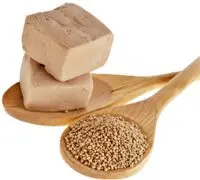 5,1 mg
5,1 mg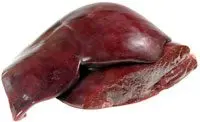 Beef liver 3,4 mg Pork liver 3,0 mg Turkey liver 2,7 mg Chicken liver 2,3 mg
Beef liver 3,4 mg Pork liver 3,0 mg Turkey liver 2,7 mg Chicken liver 2,3 mg Beef kidneys 3,0 mg Pork kidneys 1,7 mg
Beef kidneys 3,0 mg Pork kidneys 1,7 mg 2,45 mg
2,45 mg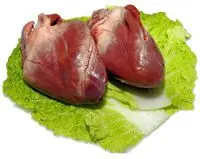 Pork heart 1,7 mg Turkey heart 1,5 mg Beef heart 1,2 mg Chicken heart 0,7 mg
Pork heart 1,7 mg Turkey heart 1,5 mg Beef heart 1,2 mg Chicken heart 0,7 mg 1,5 mg
1,5 mg 1,2 mg
1,2 mg Feta 0,8 mg Goat 0,7 mg
Feta 0,8 mg Goat 0,7 mg 0,8 mg
0,8 mg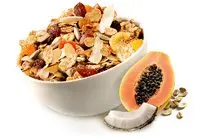 Dry 0,8 mg
Dry 0,8 mg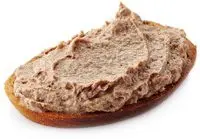 0,6 mg
0,6 mg 0,6 mg
0,6 mg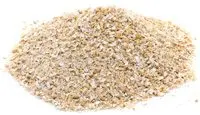 0,6 mg
0,6 mg 0,5 mg
0,5 mg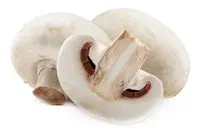 0,5 mg
0,5 mg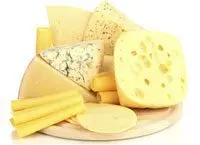 0,2-0,4 mg
0,2-0,4 mg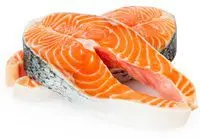 Baked 0,4 mg
Baked 0,4 mg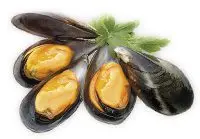 0,4 mg
0,4 mg 0,4 mg
0,4 mg Raw 0,4 mg Fried 0,2 mg
Raw 0,4 mg Fried 0,2 mg+ 15 more foods rich in vitamin B2 | |||||
Mackerel | 0,4 mg | Bread white | 0,3 mg | Fistashki | 0,2 mg |
Bread crumbs | 0,4 mg | Popcorn | 0,3 mg | Pike, pike, pike, horse mackerel | 0,2 mg |
Herring | 0,3 mg | Buckwheat | 0,3 mg | Red beans, lentils | 0,2 mg |
Milk and white chocolate | 0,3 mg | Curd | 0,3 mg | Coffee (freshly brewed) | 0,2 mg |
Turkey, beef, pork, lamb | 0,3 mg | Chicken | 0,2 mg | Milk sausages | 0,2 mg |
View the entire table of herbal products 250+ ➤
View the entire table of animal products 150+ ➤
Daily intake of vitamin B2 for women, men and children
Recommendations for the use of riboflavin have been developed in more than 30 countries. The approved dosage for the adult population is 1,2-2,2 mg per day. Medical observations prove that vitamin B2 deficiency is formed in the body after 90 days with the use of 0,55 mg of riboflavin per day.
A healthy man should take 1,4-1,8 mg of vitamin B2, a woman – 1,2-1,3 mg. During pregnancy, the female body’s need for riboflavin increases by 0,3 mg, in the first 6 months of the breastfeeding period – by 0,6 mg and by 0,4 mg throughout lactation. Infants in the first 6 months of life are recommended 0,4 mg. From six months to 10 years, children are given up to 1,2 mg of vitamin B2.
Categories of people | Daily requirement, mg |
0-6 months | 0,5 |
7-12 months | 0,8 |
1-3 years | 0,9 |
4-6 years | 1,2 |
7-9 years | 1,5 |
10-14 years | 1,6 |
Men 15-18 years old | 1,8 |
Men 19-59 years old | 1,5 |
Men 60-74 years old | 1,7 |
Men older than 75 years | 1,6 |
Women 15-18 years old | 1,5 |
Women 19-59 years old | 1,3 |
Women 60-74 years old | 1,5 |
Women older than 75 years | 1,4 |
Pregnancy | 2,0 |
Lactation | 2,2 |
At one time, an adult can take from 5 to 10 mg. With severe symptoms of hypovitaminosis, it is allowed to take up to 10 mg three times a day. The treatment course is 1-2 months.
Factors that increase the need for vitamin B2
The need for riboflavin increases with pathologies of the thyroid gland associated with a decrease or increase in its functions. Some pharmacological drugs used in the treatment of mental disorders, tableted contraceptives cause the destruction of vitamin B2. The same property is characteristic of boric acid, the main component of most household chemicals.
Vitamin B2 is quite resistant to high temperatures, but extremely vulnerable to light, it quickly dissolves in water. It keeps for a long time in the products stored in the refrigerator. In the process of defrosting in the light, it is destroyed in vegetables, beef meat.
Refusal of drugs, the use of boric acid will help to avoid the removal of riboflavin from the body. To keep it in the composition of frozen foods, it is recommended to immerse them in boiling water during cooking. To defrost, it is best to wrap the meat in aluminum foil and place in the oven.
Features of use during pregnancy
In 80% of pregnant women, a persistent drop in the level of vitamin B2 in the blood is recorded. Signs of hypovitaminosis are manifested in the early postpartum period by unpleasant sensations in the mammary glands, the occurrence of nipple cracks, and the development of mastitis.
In order to avoid the appearance of negative symptoms in the last trimester of pregnancy, a woman is recommended to take 20 mg of riboflavin per day. During the first week after childbirth, the dosage is doubled – 20 mg twice a day.
With the appearance of cracks in the nipples, oral to the oral administration of the drug, add local applications of 2% riboflavin ointment. It is applied to the injured areas after feeding the child at least 3 times a day.
Physicochemical characteristics
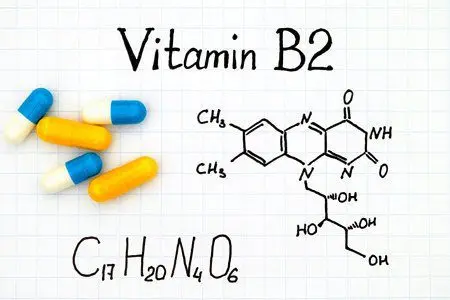
Needle crystals of riboflavin are yellow-orange in color, grouped into drusen, and have a bitter taste. The active compound is stable in an acidic environment, but rapidly decomposes in an alkaline environment. When heated, it retains its crystal lattice. Vitamin B2 is a natural calorific agent that has a positive effect on human health. Riboflavin derivatives coenzymes – are part of vital redox enzymes.
Interaction with other substances
Vitamin K, folic acid and riboflavin enhance each other’s active actions.
Thyreoidin – promotes the accelerated transition of vitamin B2 to coenzymes.
Erythromycin, tertacycline – accelerate the excretion of riboflavin.
Nicotinic acid in combination with B2 stimulates detoxification processes, accelerates the excretion of metabolic products.
The strongest antipsychotics, antidepressants of the group of tricyclic compounds, drugs for dilating peripheral vessels inhibit the utilization of riboflavin, inhibit the formation of biologically active coenzyme forms.
Vitamin B2 increases the absorption of zinc preparations.
B2 contributes to the accumulation and enhancement of the pharmacological properties of iron.
The diuretic drug spironolactone completely inhibits the synthesis of riboflavin.
Antihypertensive drugs and diuretics reduce the bioavailability of the vitamin, and contribute to the rapid transformation of vitamin B2 into coenzyme compounds.
Boric acid destroys riboflavin.
Data on the interaction of vitamin B2 and other drugs make it possible to draw up the most effective program for the treatment and prevention of beriberi in different groups of patients.
Vitamin B2 coenzymes
Vitamin B2 is an integral part of the coenzyme glutathione reductase, which is independently synthesized by the body. With a vitamin deficiency, its activity decreases. It is necessary for the reconstruction of cellular antioxidants, such as glutathione, after the completion of the oxidation reaction. Glutathione protects cells from the negative effects of peroxide components, free radicals. With its help, the body gets the opportunity to resist harmful external factors.
Glutathione, during the reaction with radicals, endows active molecules with electrons that activate compounds. Oxidation of the tripeptide occurs, accompanied by a loss of protective characteristics. The antioxidant properties of the cell are restored due to glutathione reductase, which reconstructs the used glutathione and restores its activity.
Riboflavin coenzymes are an essential component of redox processes. Oxidation of cells provokes the development of irreversible cellular pathologies. The containment of these mechanisms contributes to the formation of protective properties against oncological transformations.
Vitamin B2 is essential for the metabolism of folic acid, niacin, vitamin B6 and iron. It is an obligatory component of coenzymes, which are necessary for the absorption of proteins, fats, carbohydrates. Riboflavin converts nutrients into energy.
The biological role of vitamin B2 in the human body
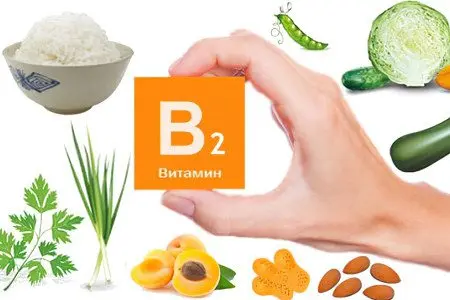
Without vitamin B2, the physiological metabolism of fatty acids is impossible. Its level is directly related to blood glucose levels. Flavonoids of riboflavin nucleotides, being converted into coenzymes, take part in the synthesis of proteins, stimulate the formation of hemoglobin, both in normal hematopoiesis and in anemia.
The large intestine of a healthy person is inhabited by specific microorganisms that synthesize free riboflavin. The villi of the colon actively absorb it. The degree of absorption depends on the food that the person prefers. In laboratory studies, it was found that more riboflavin is produced when eating plant foods. If meat is the basis of the daily diet, less of the active compound is produced.
An extensive list of indications for the use of riboflavin is due to the spectrum of pharmacological effects:
Antihypoxic. B2 strengthens the shells of body cells, helps them produce and fully utilize ATP molecules. With its help, oxygen metabolism in the tissues is restored.
Detoxification. Riboflavin is required for the production of glutathione, which neutralizes free radicals. Without it, the normal functioning of hepatocytes, specific liver cells, is impossible.
Keratoplastic. Vitamin B2 preparations have an anti-inflammatory effect in case of skin diseases, activate regeneration processes in case of wounds, trophic ulcers.
Anabolic. Compliance with an active sports lifestyle requires the daily use of sufficient doses of riboflavin. The drug stimulates the formation of protein in muscle fibers, accelerates the reactions of plastic synthesis.
neurotropic. The combination of B2 and lecithin ensures the formation and regeneration of the myelin sheaths of nerve fibers. Preservation of stable indicators of serotonin, GABA, dopamine is ensured with a sufficient level of riboflavin.
Vitamins of various groups, including B2, cannot be deposited in the body. To maintain optimal levels of riboflavin, it is best to take vitamin supplements in the form of pills or tablets.
[Video] Organic Chemistry, Vitamin B2:









